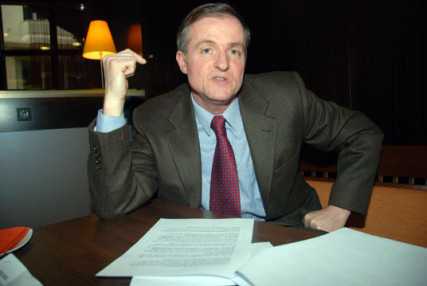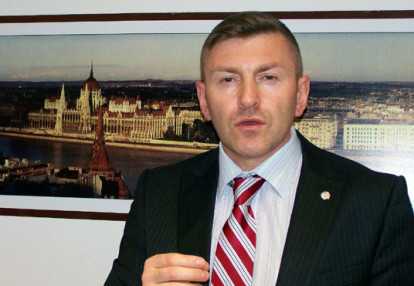The Alliance Discussed New Strategies In Hungary
Szöveg: László Szűcs | 2009. március 25. 17:35Between March 17–19, the strategic representatives of NATO’s Military Committee held their session in Hungary. In the first half of the two-day event, the strategists had a closed meeting about rewriting the document regulating the entire structure of NATO forces, and the cornerstones of a new naval strategy.
On the second day of the conference, the participants paid a visit to HDF 86th Szolnok Helicopter Base and HDF 34th ’László Bercsényi’ Special Operations Battalion.
Major General István Békesi, the Hungarian military representative to NATO made a proposal in September 2008 for organizing the informal session of the Strategic Committee in Hungary, with the aim to – and on the occasion of NATO’s 60th anniversary (April 4, 1949) and the 10th anniversary of Hungary’s NATO membership (March 12, 1999) – provide an opportunity to discuss topics that are timely and of key importance for the Alliance.
Having embraced the initiative, the Chief of the HDF Defence Staff agreed to be the main sponsor of the event, and invited NATO’s strategic representatives to our country. The event was hosted by Brigadier General László Frigyer, Head of MoD Defence Planning Department. The apropos of the Budapest session was that the dean of NATO strategic representatives is a Hungarian senior officer, Lieutenant Colonel Dr. Tibor Babos.
Not even the military press were given admission to the NATO meeting, but during the break honvedelem.hu had a chance to make a short interview with Colonel Denis Heimferte, Chairman of NATO’s Strategic Committee, and Hungarian strategic representative Lt.Col. Dr. Tibor Babos, elected Dean of NATO’s Strategic Committee by 26 nations.
Col. Heimferte said about the committee chaired by him that NATO Headquarters have two main organizations, a political and a military one. The political organization is led by the North Atlantic Council, while the military is led by the Military Committee. The Strategic Committee belongs to the hierarchy of the latter and its main aim is to elaborate military strategies relying on NATO’s political guidelines and ambitions, that will provide a basis for the organization and deployment of the joint military forces of the Alliance, estimated to be around one million troops. In fact the Strategic Committee deals with every topic which is qualified as ‘strategic’ by NATO’s two main committees, that is by the nations. In recent months, strategic issues such as filling up the NATO Response Force, reorganization of the entire command structure, rationalization of NATO’s system of planning, analisys of security challenges facing the Alliance, or the impact-based approach of operations have been on the agenda.

In the opinion of the chairman of the Strategic Committee, NATO has arrived to a kind of a milestone. Not only because on April 4, the Alliance will celebrate its 60th anniversary, but because in the past two decades and especially in the recent past there have been changes in international security, which have forced the North Atlantic Alliance to give pragmatic responses. Therefore he thinks that the professional debates preparing for NATO’s new strategic concept, and the efforts with which the expeditionary and response capabilities of NATO can be improved, will probably accelerate in the near future.
The chairman also told us that all 26 NATO member states, and Albania and Croatia as invitees contribute to the work of the Strategic Committee, which is eventually a forum, a professional round table. About the busy schedule of the committee Col. Heimferte said that they usually have three or four sessions a week in Brussels, focusing on various topics. These are so-called formal sessions where decisions are made by adhering to the principle of consensus. He also added that the strategic issues of the coming summit require almost ‘non-stop’ work in this period.
This is exactly why the Budapest informal session was especially significant, for having broken away from the tight schedule and strictly regulated environment, the Special Committee could put together its agenda points informally by itself, and was given insight into the everyday life of a NATO member state.
The chairman informed the press about the specific topics and outcome of the Budapest informal session with reserve due to their confident nature. We have learned that the meeting was about the new wording the document regulating the entire structure of NATO forces, and the fundamental issues of a new naval strategy, but no further details are known yet. He said: both topics are of key importance, the first one may bring forth the reorganization of the entire military structure of NATO, and the other one was in the focus of attention due to the increased number of pirate attacks at the East African coastline.
Upon the inquiry of honvedelem.hu Lt.Col. Babos said: the position of the dean is filled by election, the candidate was elected by the representatives of 26 nations. Beyond the fact that he considers this elected position an exceptional honour, he has to fulfill serious professional and protocolary obligations. Currently he is responsible for protecting the interests of NATO’s strategic representatives before NATO’s International Military Staff – provided there is a need for that, and the same is true if the situation is the opposite because NATO turns to him in case there is a procedural problem or the introduction of a new method is planned. Lt.Col. Babos is also responsible for promoting the ease of disagreements occurring in the strategic community of NATO as a mediator whenever it is necessary, and representing the strategic delegates of NATO’s Military Committee at official and protocolar events.

Lt.Col. Babos did not deny: it is not a coincidence that the working group visited Hungary, and naturally there is a connection between the position of the Hungarian dean and the Budapest conference. It is not a coincidence either – he added – that the delegation paid a visit to HDF 34th ’László Bercsényi’ Special Operations Battalion, where Lt.Col. Babos, as the commander of a special reconnaissance team, was given his first assignment as an officer in 1989. "After the Chief of the Defence Staff had given a permission to organize the event, together with the Defence Planning Department we were aiming at presenting a program that would give maximum experience for the participants regarding its content, form, and protocolar aspect. It is not an overstatement to say that we have achieved this aim – due to the kind support of Hungarian organizers, especially Lt.Col. János Lengyel, and other contributors – beyond expectations," emphasized the dean.
As regards the substantial topics, it is certain that this Budapest meeting will be referred to several times at NATO Headquarters, and perhaps it is not impossible either that the recent informal session will open the road for two important documents such as the transformation of the present structure of NATO forces, and the elaboration of a naval strategy. According to Lt.Col. Babos NATO’s strategic experts highly appreciated the visit to the Szolnok corps, the principal aim of which was to demonstrate the Hungarian special operational capability. First Colonel Zoltán Mihócza, Deputy Head of MoD Operational and Training Department spoke about the Hungarian ambitions for obtaining special operational capabilities, then Brigadier General Imre Lamos, Commander of the Szolnok Helicopter Base presented the garrison and the provision of air transport to support special operational capabilities. Following the presentations, Colonel Tamás Sándor, Commander of HDF 34th ’László Bercsényi’ Special Operations Battalion took over the role of the host. The combat, arms, and parachuting demonstration of the ’special ones’ took everybody’s breath away.
Honvedelem.hu has also learned that the chairman of the committee will report to the director of the International Military Staff on the outcome of the meeting in the first half of next week, who will decide on how to progress from here. It is certain that the topics discussed in Budapest will be in the focus of attention in Brussels for a long time.